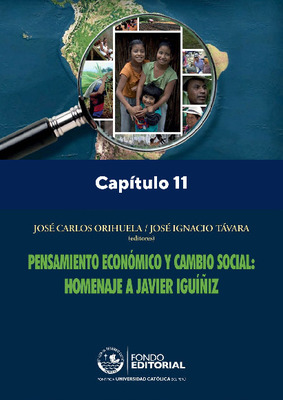| dc.contributor.author | Paredes, Maritza | |
| dc.date.accessioned | 2023-03-28T21:51:09Z | |
| dc.date.available | 2023-03-28T21:51:09Z | |
| dc.date.issued | 2014 | |
| dc.identifier.uri | https://repositorio.pucp.edu.pe/index/handle/123456789/191123 | |
| dc.description | Páginas 329-358 | |
| dc.description.abstract | In this paper we explore in part 1 the historical roots of the marginalisation of the highlands, and with that the inadequate or perverse presence of the state. In part 2 we show the deficiencies of this model in the pre-conditions for trickle-down, and the weak or perverse nature of local politics. In part 3 we use this analysis to explore a remarkable contemporary instance of developmental initiative in the highlands, which has ultimately been intensely disappointing in its outcomes, and we ask what the barriers and failures were: this is the case of Espinar. | es_ES |
| dc.language.iso | spa | es_ES |
| dc.publisher | Pontificia Universidad Católica del Perú. Fondo Editorial | es_ES |
| dc.relation.ispartof | urn:isbn:9786123170639 | |
| dc.rights | Atribución-NoComercial-SinDerivadas 2.5 Perú | * |
| dc.rights | info:eu-repo/semantics/openAccess | es_ES |
| dc.rights.uri | http://creativecommons.org/licenses/by-nc-nd/2.5/pe/ | es_ES |
| dc.source | Pensamiento económico y cambio social : homenaje a Javier Iguíñiz | |
| dc.subject | Desarrollo humano--Perú | es_ES |
| dc.subject | Integración económica--Perú | es_ES |
| dc.subject | Desarrollo regional--Perú | es_ES |
| dc.subject | Distribución del ingreso--Perú | es_ES |
| dc.title | Flattening the Andes : growth points, spread effects and perverse institutions | es_ES |
| dc.type | info:eu-repo/semantics/bookPart | |
| dc.type.other | Capítulo de libro | |
| dc.subject.ocde | https://purl.org/pe-repo/ocde/ford#5.02.01 | |
| dc.publisher.country | PE | |
| dc.identifier.doi | https://doi.org/10.18800/9786123170639.011 | |


